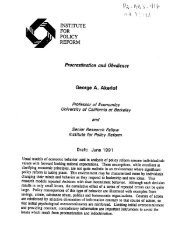FAMILIAL ADAPTATIONS TO THE INTERNATIONALIZATION OF ...
FAMILIAL ADAPTATIONS TO THE INTERNATIONALIZATION OF ...
FAMILIAL ADAPTATIONS TO THE INTERNATIONALIZATION OF ...
Create successful ePaper yourself
Turn your PDF publications into a flip-book with our unique Google optimized e-Paper software.
-13<br />
(and child) labour remains oriented towards subsistence<br />
are<br />
production.<br />
being only<br />
Women<br />
partially absorbed into the monetized sector<br />
as a<br />
of<br />
result<br />
the<br />
of<br />
economy<br />
male labour shortage, while continuing<br />
power<br />
to reproduce<br />
at below<br />
labour<br />
its exchange value, thereby continuing to<br />
accumulation.<br />
subsidize capital<br />
For example, in the Upper Egyptian villages<br />
Hagara,<br />
of Beit<br />
where<br />
Alam<br />
male<br />
and<br />
outmigration ranges between 50 <br />
economically<br />
and 75% of<br />
active<br />
the<br />
men, labour shortages and dramatic<br />
have<br />
increases<br />
accentuated<br />
in wages<br />
dependence on the unpaid family labour of wnmen and<br />
children (Hammam 1981:10).<br />
A noticeable social consequence of male migration from rural Egypt is<br />
the increased incidence of female-headed households. A recent study of this<br />
phenomenon was undertaken by anthropologists in the village of Babel Wa Kafr<br />
Hamam in Menoufia Governorate (Khattab and El Daeif 1982). Based on case<br />
studies of a small sample of 15 labour migrant families and five non-migrant<br />
families, the researchers note a trend towards the dissolution of patrilocal<br />
residence patterns, a related emergence of nuclear families among the labour<br />
migrants' kin, and the increasing appearance of female-headed households<br />
upon departure of males. Similar changes are reported for joint families<br />
and nuclear families that shared common housing.<br />
In the village of Bahiya, as earnings from abroad<br />
perceived<br />
are increasingly<br />
to be the sole means for social mobility,<br />
extended<br />
kinship<br />
family<br />
ties based<br />
property<br />
on<br />
relations are undermined. The<br />
dissolution<br />
tendency towards<br />
of the extended family has also been<br />
should<br />
observed<br />
be<br />
in<br />
noted,<br />
Bahiya. <br />
however,<br />
It<br />
that the extent of this tendency<br />
peasants'<br />
carries with<br />
class position, related property relati.ls,<br />
the extended<br />
and contributions<br />
family labour<br />
to<br />
pool at different phases of the<br />
cycle<br />
developmental<br />
of the family. The tendency is also variable<br />
sources<br />
in relation<br />
of livelihood<br />
to primary<br />
of migrating men. Among non-agricultural<br />
dwellers such<br />
rural<br />
as teachers or those involved in non-agricultural<br />
activities, commercial<br />
the tendency towards the dissolution of<br />
intensifies<br />
extended <br />
in<br />
families<br />
relation to migration. But, even in<br />
relations <br />
such cases,<br />
influence<br />
property<br />
couples' decisions. Indeed, in some cases<br />
family<br />
extended<br />
membership is a welcome form of familial adjustment<br />
economic<br />
which<br />
as well<br />
provides<br />
as emotional security, at least immediately<br />
migrant<br />
following<br />
male's departure.<br />
the<br />
Contributions to the financing<br />
to<br />
of<br />
the<br />
a male's<br />
PPC may<br />
trip<br />
come not only from nuclear family members (e.g.<br />
wife's<br />
the<br />
jewelry),<br />
sale of a<br />
but also from the savings of others in the<br />
household,<br />
extended family<br />
and from affinal kin. Extended family and affines may continue<br />
to be a source of support during the male's absence.<br />
Where the extended family as a household is dissolved<br />
emigration,<br />
a correlate<br />
the<br />
of<br />
power of the mother-in-law is undermined.<br />
authority of<br />
Similarly,<br />
senior females<br />
the<br />
in joint family households is challenged.<br />
Khattab and El Daeif's study reveals that
















